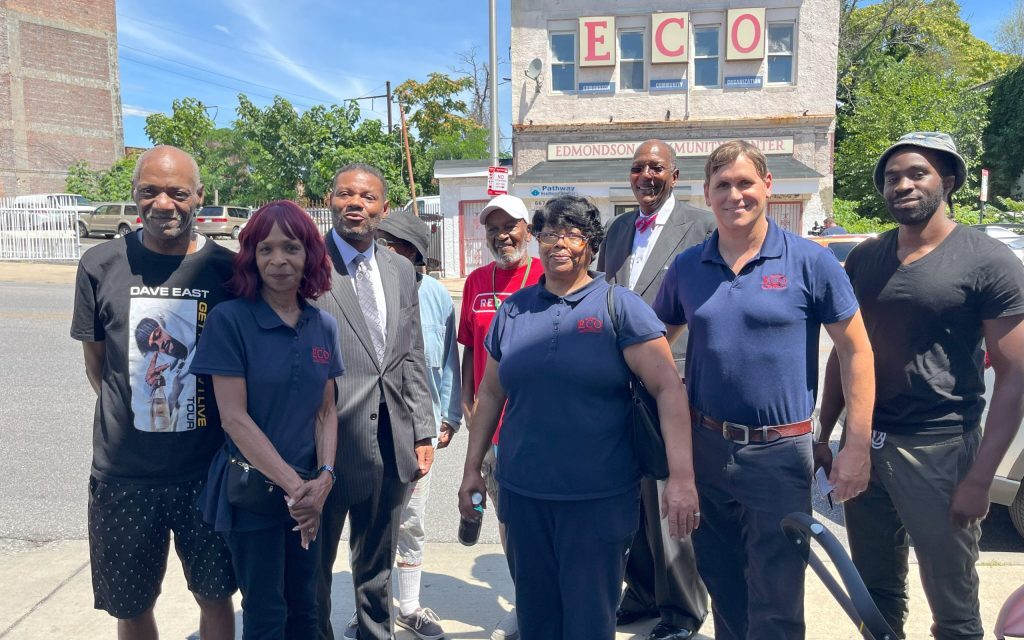By Megan Sayles
AFRO Business Writer
msayles@afro.com
Maryland Legal Aid, which specializes in providing law services to impoverished families, filed a lawsuit against the city of Baltimore on July 2, asserting that its tax sale process is unconstitutional and deprives residents of the generational equity they are due.

(AFRO Photo / Megan Sayles)
The suit was filed on behalf of the Edmondson Community Organization (ECO), which lost its West Baltimore property in 2018 through the annual auction. Maryland Legal Aid and ECO claim the building was seized and sold without just compensation.
The litigation trails a 2023 unanimous decision from the U.S. Supreme Court that prohibits the government from retaining more than the initial tax debt amount after taking and selling a person’s property.
“I stand with the people who live in the homes in this community. They raise their family in these homes, they have cookouts in these homes and they build wealth in these homes that they pass down to their children and grandchildren,” said Somil Trivedi, chief legal and advocacy director for Maryland Legal Aid. “It’s these homes that are the subject of this lawsuit because the government is selling them out from under you for pennies on the dollar.”
“Worse yet, the city is actively depressing the equity in those homes, robbing your families and communities of the vital generational wealth that is required to keep this community running,” he continued.
When an individual fails to pay their property taxes, the government can place a tax lien on the home. Each year, the city of Baltimore sells these tax liens in a public, online auction to outside bidders, ultimately awarding them to the highest bidder. The former property owner is entitled to receive compensation equal to the difference between the amount of the tax lien and winning bid.
ECO and Maryland Legal Aid argue that the city’s process is unlawful for several reasons: it charges a high-bid premium that discourages bidders from making fair bids, it does not impose a minimum bid other than the amount of the lien and it does not adequately advertise the properties for sale, which hinders competition.

They believe these factors have led to homes being sold for a fraction of their true market value.
“Yes, people have to pay their taxes— of course they do,” said Jonathan Sacks, executive director of ECO’s development division. “But, it’s about a super complex system that is perfectly constructed for sophisticated, large-scale investors to steal the generational equity of low-income and, often, African-American families and leaving a housing detritus across Baltimore in the wake of those actions.”
According to the complaint, ECO owed $2,543 in taxes when its headquarters became part of the city’s tax sale in 2018. California-based investor Tempest, purchased the nonprofit’s lien for $5,115. After foreclosing on ECO’s right of redemption in 2019, Tempest sold the property for $139,500 during a public auction in 2022.
Prior to the sale, ECO president Joe Richardson raised $65,000 to buy back the property from Tempest, but the company refused the offer, according to the complaint. ECO received just $2,571 from the city, the balance of the tax sale.
“To the city, we say your tax sale is not a property sale,” Sacks added. “Yet, in many cases, it’s acting like one unfairly by giving away to speculators—through the backdoor— the homes, community centers and businesses of Baltimore residents, while giving nothing or next to nothing back in compensation to those owners.”
ECO was established in 1993 to serve the Midtown-Edmondson neighborhood, a primarily Black and long disinvested community. It opened its Edmondson Avenue community center in 1995.
Sacks said ECO’s building was the last community asset in the neighborhood, as it does not have a school, city-run facility, library or police station. ECO is seeking monetary damages from the city and asking a U.S. District Court to require Baltimore to end its practices.
“Your extractive, tangled title-creating, long-term vacancy-spreading, community-destroying tax sale is going to be over with this case,” said Sacks. “It’s time to build a new tax sale model—one based on extreme empathy for low-income, marginalized residents facing hardship, one with policies that value properties for what they are actually worth when a taking is absolutely necessary and one that returns the excess equity after taxes are paid back to the original owners, not to the speculators.”
The post Maryland Legal Aid sues Baltimore City for ‘unconstitutional’ tax sale appeared first on AFRO American Newspapers.









